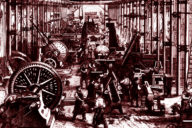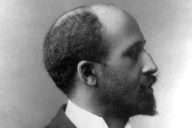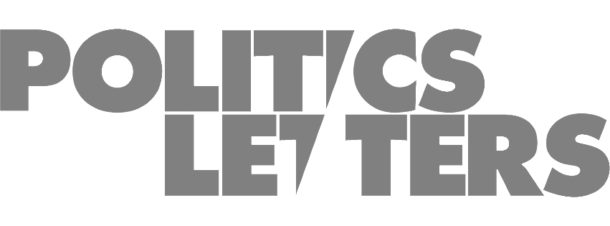By Greg Renoff
In the spring of 1992, I decided that I wanted to be a historian. I can pinpoint this moment in time because that semester I took a history course, “American Thought Since 1850,” at Rutgers University with the proprietor of Politics and Letters, James Livingston. From that point, my career path came to include earning a PhD in American history, publishing a monograph on southern history, and earning tenure.
I was on that path until this past May, when I gave up my position as an Associate Professor at Drury University in Springfield, Missouri. The decision to resign from Drury was an agonizing one, in no small measure because university professor had been the only job I’d pursued and wanted since my days at Rutgers. But giving it up was the only logical move to make, since my wife and I had become caught up in the dreaded long distance academic couple syndrome ever since she’d taken a position at the University of Tulsa back in 2009.
But something else had happened to me back in 2009. I’d started working on a book project on the history of a legendary rock band. It was an endeavor that began as a fun diversion from my formal “research agenda,” but eventually became my primary research focus, even after it became clear that this project wasn’t going to take the form of an academic text. In fact, by 2012, I had resolved to write a rock biography geared for a general audience and publish it via a trade press.
So today, I no longer write much like an academic. That seems appropriate, because as least as far as job titles go, I’m no longer an academic. So instead of thinking about things like pedagogy and the construction of masculinity, I direct my professional energies towards promoting my comprehensive history of Van Halen’s early days, Van Halen Rising: How a Southern California Backyard Party Band Saved Heavy Metal, which will arrive in bookstores on October 1 via ECW Press.
How the hell did this transformation happen to me? To answer that question, I need to go back to the beginning of it all.
***
When I enrolled in Livingston’s course, I had no real idea what I wanted to do for a career. I’d become a history major largely because I liked history better than any other majors I might pursue, but to be honest, I liked the New York Jets, pro wrestling, heavy metal, going to concerts, and girls a lot more than I liked studying the past.
But by the end of that semester, history had come to top that list, as I was now sure that I wanted to be historian. My resolve to do so only increased after I took other history courses at Rutgers with great teachers like David Oshinsky and Lloyd Gardner.
After graduation, I entered the University of Mississippi’s MA program in American History. I had the pleasure there to study under the late Winthrop Jordan, a scholar best known for his work on the origins of racism.
After completing my MA, I headed to Brandeis University. At Brandeis I worked with many talented historians, and underwent an evolution in my intellectual interests from plantation slavery to popular culture in the South. By the time I’d completed my general exams, I had a good introduction into the secondary literature on nineteenth century popular entertainments, most of which focused on the northern states. I thus thought that an examination of similar entertainments in the southern states might break new ground.
So I ended up writing a dissertation on traveling circuses in Georgia under the able direction of Jacqueline Jones. By the summer of 2003, I had defended it and landed the job at Drury as an Assistant Professor.
***
As every academic historian knows, the most significant signpost along the road to tenure involves publishing a monograph with a well-regarded academic press. I thus reorganized, reworked, and reinvented my dissertation into a book manuscript and published it in 2008 as The Big Tent: The Traveling Circus in Georgia, 1820-1930 with the University of Georgia Press.
After the book got excellent reviews in publications like Journal of American History, the Journal of Interdisciplinary History, and the North Carolina Historical Review, I had high hopes for it.
But then something that I hadn’t expected happened.
No one really read it.
Best I can tell, the original run of 300 hardback copies still hasn’t sold out, even though the book later did get issued as a paperback. Occasionally, I’d get an email from a scholar about The Big Tent, or I’d see that a historian had cited the book. But overall, the book made no meaningful impact on any of the academic fields I’d tried to engage in the text. I must admit that the fact that the book came and went without making any sort of stir bothered me.
***
In the months that followed its publication, I thought about the fact that The Big Tent hadn’t made waves, and what I’d do differently to change that outcome if I wrote another book. I also thought a lot about why the topic of circus performances in the context of the American South had drawn me in so deeply.
Around 2009, I made a connection that I’d never deeply examined while I was researching and writing the dissertation and the book.
When I’d read late nineteenth century Georgia newspapers published on the days following circus performances, I’d invariably come across stories about men who’d been arrested for drinking and fighting in town on Circus Day. Sometimes these skirmishes even happened in the morning, hours before performances began. Not infrequently, I’d read editorials lamenting the deleterious moral effects of circus performances. Preachers, too, condemned the anti-religious aspects of the popular entertainment in conversations with reporters.
Then it hit me. The same dynamic between popular entertainment and social release on display in late nineteenth century Georgia had surrounded 1980s rock concerts. I knew this because I’d participated in it as a New Jersey teen. Back in the day, my friends and I would get our hands on a few cases of beer. We’d camp out in the parking lot of concert spots like the Brendan Byrne Arena and proceed to get loaded with the thousands of other Garden State heshers who’d turned out for the concert. To pass the time, we’d watch the drunks fight in the parking lot and get arrested by the State Police. Then while on our way into the arena we’d sometimes encounter street preachers who promised we were all going to hell if we didn’t change our evil ways.
So years later I came to realize that during graduate school I’d had a desire to write about heavy metal and arena rock, but hadn’t had the guts to do so. I couldn’t imagine myself walking into, say, David Hackett Fisher’s office at Brandeis and telling him I’d like to write a seminar paper on the California Jam of 1974. So I approached these issues that interested me — audience reception, the transmission of cultural forms, and the economics of popular entertainments — through the more academic-friendly topic circus performances.
Even though I didn’t write about rock music at Brandeis, or during my first years as a professor at Drury, the urge never went away.
***
There’s a saying that an American kid’s musical tastes are formed around the time said kid drinks his first beer. That was true in my case. When I was fourteen, I saw Van Halen on their 1984 tour. This concert was louder, bigger, and more spectacular than anything else I’d seen in my life. Frontman extraordinaire David Lee Roth came off like a cross between Tarzan and Spiderman. Guitarist Eddie Van Halen unleashed sounds from his guitar that sounded unlike any other guitar playing I’d ever heard in my life. I immediately became a massive fan.
For the remainder of the 80s, I devoured everything related to Van Halen in print: the quick-buck bios that are published any time a new act breaks, interviews with band members, and newspaper and magazine articles. This habit continued in the decades that followed, and by the time I was working as a professor, I’d taken to reading rock bios about my other favorite bands, like Led Zeppelin and the Who, for fun.
As a historian, though, something kept bothering me about the things I read — and didn’t read — about Van Halen’s past. I could gather a lot of information about Van Halen’s career path after the band became famous in 1978, but there was precious little information available about the group’s pre-fame years, when the quartet had labored in and around Pasadena, California as a bar band. I soon came to understand that only fragmentary information existed in print about the band’s history between 1973 and 1977. Even worse, from my perspective, was the fact that the different accounts that I’d read regarding the group’s early years often contradicted each other.
Meanwhile, I’d pick up biographies on canonical rock bands like Led Zeppelin, the Beatles, and the Who, and I’d find that the beginnings of these groups had been well documented.
In my head I kept going back to the fact that Van Halen had sold somewhere north of 80 million albums, was a Rock and Roll Hall of Fame Inductee, and featured perhaps the greatest electric guitarist of all time, and I couldn’t find out with certainty something as elementary as the year that Van Halen actually formed.
I believed this was a problem that needed fixing, and in an act of self-confidence or arrogance — take your pick — I decided I was the guy to fix it. By that point (2009) I had tenure, and understood that my academic writing hadn’t exactly set the world on fire. So even though this kind of project would do little for my academic fortunes, I said fuck it. I’m going to write a book about Van Halen’s early years.
—
My Van Halen research immediately took me in directions that would have raised eyebrows at Brandeis. My look at the band’s past began in earnest after I interviewed a former nightclub owner who had booked Van Halen back in 1975. His club’s specialty at that time was wet-t-shirt contests, so he suggested that I then speak to a few ladies who’d participated in them while Van Halen was onstage. I then began tracking down Pasadena locals who’d grown up with the band members, or in other cases, had hired Van Halen to play in their backyards. Van Halen’s backyard parties, which sometimes attracted thousands of teenagers, were legendary in Pasadena.
As the years rolled on, I spent long hours front of microfilm machines in places like New York City, Oklahoma City, and Pasadena. I also continued conducting my interviews, sometimes doing as many as five a week. In the end, my list totaled more than 230 individuals, and had come to include such luminaries as former Van Halen bassist Michael Anthony, producer Ted Templeman, engineer Donn Landee, and their former manager, Marshall Berle.
Selling the project to a trade press — and of course, convincing a literary agent to take me on as a client — presented another set of challenges. It took time, but I eventually purged my writing of academic jargon and got focused on the only real task that now mattered: to tell the story of how Van Halen got together, developed their sound and crafted their live act, recorded a debut album that changed rock history, and then broke big in 1978. Zeroing in on those things allowed me to get an agent, who then helped me get a book deal for Van Halen Rising with ECW Press.
—
All during the years I was writing and researching the book, I was commuting from Tulsa to Springfield to teach my classes at Drury. But by the start of the fall of 2014, I’d had enough of spending weeknights away from my wife and children. So I took what marketing guru Seth Godin calls “a leap.” I resigned my faculty position, effective May 2015, and gave up tenure, even though I’m not sure what professional opportunities are next for me now that I’ve taken that step.
In the meantime, I’ve got a book forthcoming. Even though Van Halen Rising won’t be out until October, I’ve got plenty on my plate. I promote the book via social media, and take on all opportunities to talk about my project to everyone from podcast interviewers to newspaper reporters. My interest in this aspect of the publishing game certainly stems from my passion for my subject matter, but I’m also kept awake at nights by something I read a few years back about the nature of trade book publishing: if an author’s first trade book doesn’t sell well, there likely won’t be a second trade book appearing by that author.
But there’s something else that keeps me going — and let me take this leap back in 2009. Around that I remember talking to Livingston about my idea to write a book about Van Halen, this after I’d gotten some less than enthusiastic feedback about the idea from other academics whose judgment I trusted. Livingston said, in effect, “that sounds like a great fucking idea.”
He was right.






No Comments